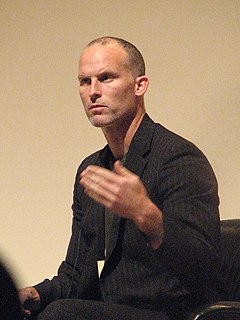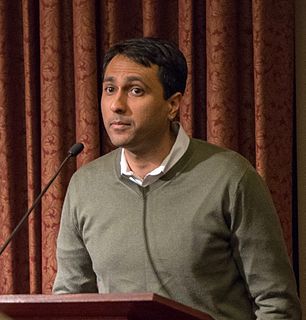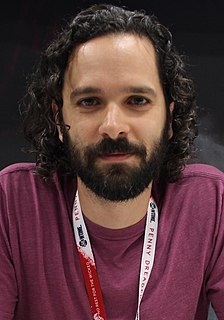A Quote by Emily Susan Rapp
I do write fiction, and I find it more difficult, but also more liberating. On the one hand, you can make up the story, but you have to make up the story.
Related Quotes
I've always been into 'fast-paced, don't bore 'em, keep it moving along, stick with the story.' You know: tell a story the way I want to hear a story. I find it more rewarding to write for kids, but I also find it a little easier, because you can just let loose a little bit more in terms of fantasy and stuff.
It's difficult to make movies. For me it was easier, as a refugee in Switzerland, to make documentary films, because I didn't need a lot of money for it. The way I tell my story or my opinion would be very similar in both fiction and documentary forms. But I found I could speak more effectively to convey this brutal reality through documentary than I could through fiction.
It's hard to tell if anyone's interested in reading a serialized story. But it's interesting to put in a cliffhanger each week. That was popular in old comic strips. They'd write a weekend story different from the daily strip. So people follow one story day to day, and a separate story on weekends. If you read them, you think "I'll read two more." Then you're like "I gotta find out!" And you read 500 more.
Well, I don't ever leave out details, in that I don't come up with information or description which I don't then use. I only ever come up with what seems to me absolutely essential to make the story work. I'm not usually an overwriter. As I revise, it's usually a matter of adding in as much vivid details as seem necessary to make the story come clear without slowing down the momentum of the story.
Despite the natural belittling of one's self, the doubts, the insecurities, we have to wake up to the realisation that we all write our own autobiography, we are the authors of our life story. Realising that, write a good story with your life and make sure to write yourself as the protagonist. Be the hero of your journey.
In this tradition a story is 'holy,' and it is used as medicine," she told Radiance magazine. "The story is not told to lift you up, to make you feel better, or to entertain you, although all those things can be true. The story is meant to take the spirit into a descent to find something that is lost or missing and to bring it back to consciousness again.
Everywhere I go - from villages outside Kandy, Sri Lanka, to community centers in Amman, Jordan, to offices at the State Department in Washington, D.C. - I find people with a similar story. When thousands of people discover that their story is also someone else's story, they have the chance to write a new story together.
I want studios that make story-based games to start taking their stories more seriously. And that doesn't mean hiring a big shot writer from Hollywood; it means that story becomes integral to making your game. I don't see how you can achieve that without having an in-house writer that sits next to the designer, helping them make their levels, talking with the engineers about where we can tell the story more dynamically, pushing at technology.
I read somewhere once that in the 1960s, fiction writers were troubled by the notion that life was becoming stranger and more sensational than made-up stories could ever hope to be. Our new problem - more profound, I think - is that life no longer resembles a story. Events intersect but don't progress. People interact but don't make contact.
































